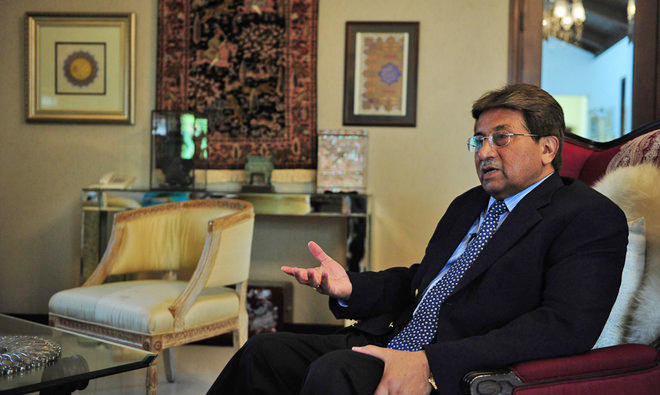ISLAMABAD: A special court ordered Pakistan’s government on Friday to ensure the arrest of former President Pervez Musharraf and suspend his passport and national identity card if he fails to return to the country.
The court was constituted in November 2013 to try Musharraf for imposing a state of emergency in November 2007 when he was president.
A three-member bench headed by Justice Yahya Afridi has been hearing the case, and has directed the Interior Ministry to ask Interpol to issue “appropriate warrants” for his arrest and for his appearance before the court.
It said the government has not made enough effort to arrest Musharraf, adding: “The court was informed that the accused is presently residing in the United Arab Emirates and that there is an Extradition Treaty between the government of the UAE and Pakistan, which could be invoked to ensure the arrest of the accused and the attachment of his properties in the UAE.”
Musharraf was indicted in March 2014, but rejected the charges against him. He left Pakistan for Dubai in the same month for medical treatment after the federal government allowed him to travel abroad. A few months later, the court declared him an absconder for not appearing before the bench.
Musharraf’s counsel, Akhtar Shah, told the judges during the last hearing that his client intended to appear before the court, but that he was facing threats to his life for which he required security from the Defense Ministry.
Prosecution lawyer Akram Sheikh told the court that the Interior Ministry is ready to provide “fool-proof security” to Musharraf in Pakistan.
Shahzad Arbi, a spokesperson for Musharraf’s All Pakistan Muslim League, said the former president had sent a formal request to the Interior Ministry on March 13 for the provision of security upon his return, and “we are still waiting for an official response from the ministry.”
Arbi said Musharraf is ready to return to Pakistan and face all cases against him if the ministry provides sufficient security.
“The ball is in the government’s court now, and we hope to receive a positive response,” Arbi told Arab News.
Interior Ministry spokesman Yasir Shakeel confirmed to Arab News receipt of Musharraf’s request for security, but declined to share further details.
Senior advocate Sharafat Ali said the government will have to comply with the court orders, otherwise contempt proceedings could be initiated against relevant Interior Ministry officials.
He said the court is pressing the government to bring back Musharraf because it cannot proceed against him in absentia.
“The government can invoke the extradition treaty with the UAE if Musharraf defies the court orders and fails to return to Pakistan voluntarily,” Ali told Arab News.



















